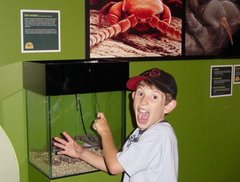Well, I've left INTERCOM and arrived in Auckland at the New Zealand National Digital Forum conference. Am facilitating a fascinating session looking at Te Ara – the Encyclopaedia of New Zealand and Our Space – a new multimedia space at The Museum of New Zealand Te Papa Tongarewa. I have heard people (well, only Angelina!) rave about the latter installation so be really interested to see what the developers have to say.
In the afternoon I ran an audience research workshop and the slides from that can be found here.
Wasn't able to get to the first day of their conference (or indeed their conference dinner, probably a good thing given the way I feel today!) but you can get more information here.
Paul Gerhardt, Archive for Creativity (UK) talk:
- By 2010 all the info on the internet will double every 11 hours, YouTube has broadcast more hours of movies in past six months than three major networks broadcast between 1948 and 2008.
- Mentioned Video Republic report – Demos 2008 (this is a good read by the way)
- How has media shaped the ways we communicate? Emergence of writing meant a skills barrier – need to know how to read and write, now we have a plethora of products we can use beyond texts, including audio, moving images and sound
- The written word has been central to how we renew our cultures – why should it be different for moving images?
- George Bernard Shaw wrote about the importance of cinema in 1914
- Five forms of Digital Literacy
- Where is the low-hanging fruit? In public service broadcasting, given that we need to open up access to 100 years of moving images
- But – who pays for it? Who owns it? Who looks after it? Who has rights to distribute it?? The BBC worked on this in their Open BBC project, they established an advisory group form across industry, community, etc
- Public value and commercial value
- Showed an awesome film about the Open Archive and how to do stuff – can't find that exact film online but will keep looking. They did audience research all the way through the pilot and changed their program based on that. There is also a very interesting section – Teachers'' TV – with lots of online resources for teachers
Eight lessons from the project:
- Design a future proof system
- Coopt all stakeholders
- Prove the concept by conducting a pilot
- Open up to creator-generated content
- Develop infrastructure with other partners
- Demonstrate public value (plus two others I didn't get down in time)
But with funding restrictions and a new regulatory regime meant the project didn't go ahead – what a bummer! Good talk tho.



No comments:
Post a Comment